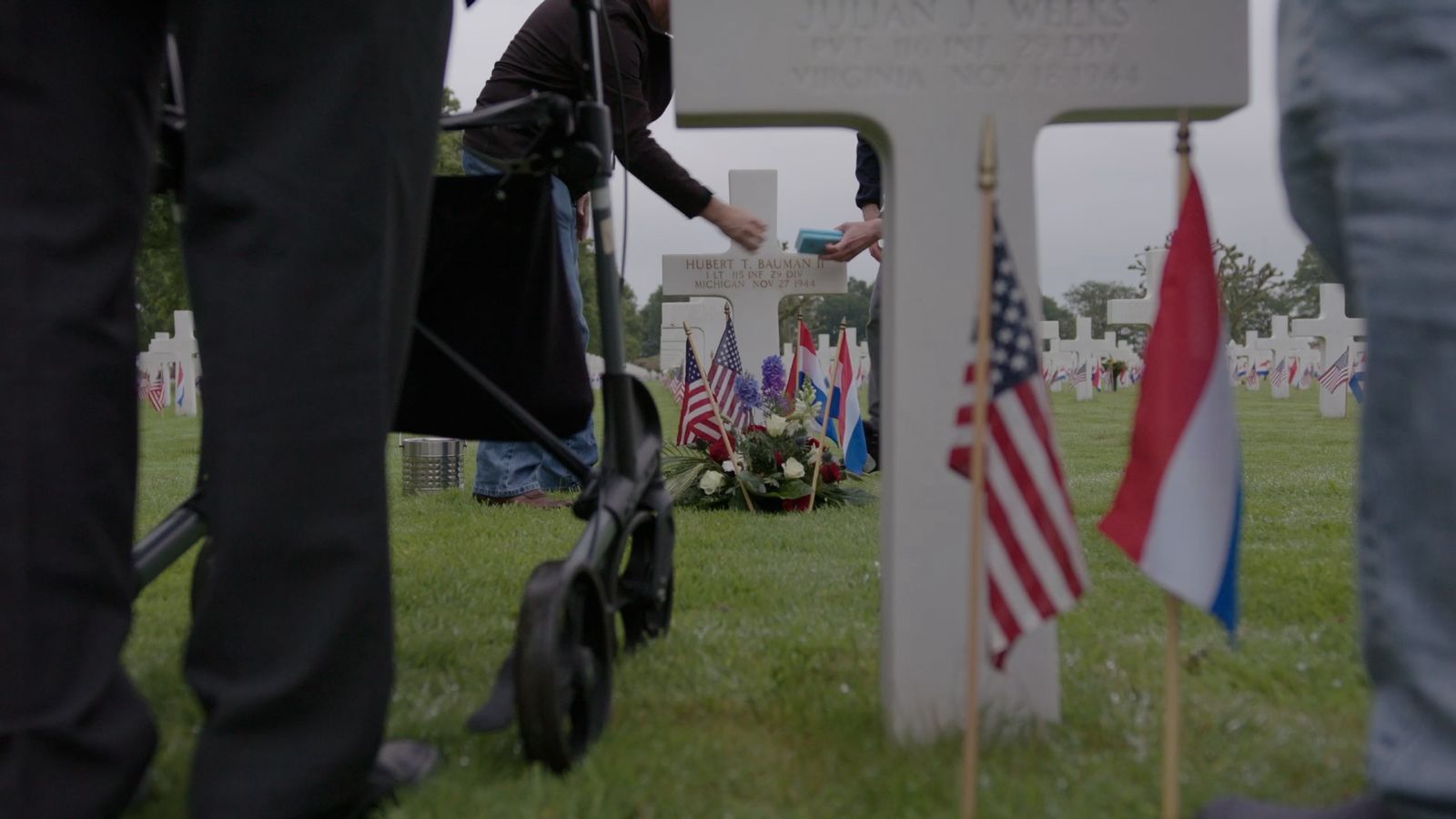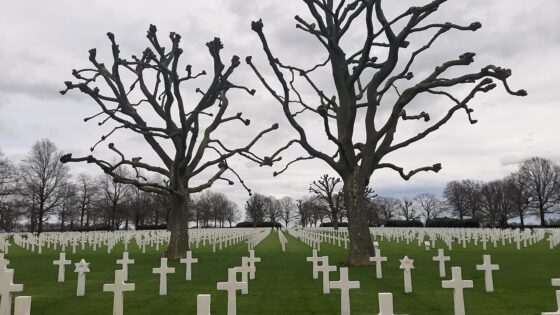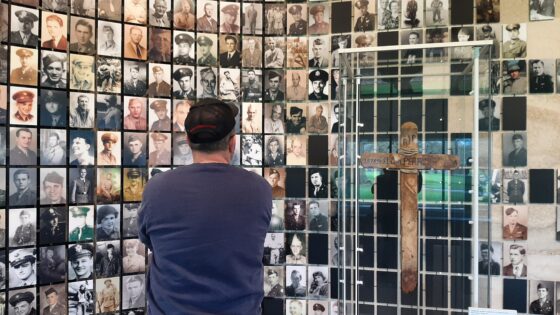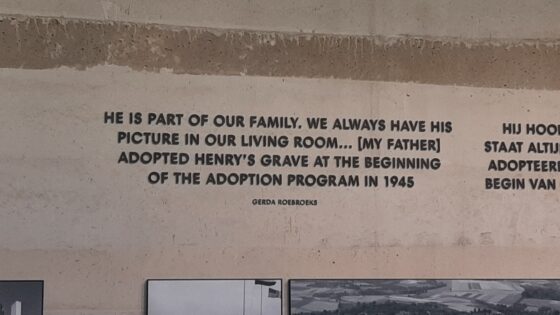Lessons in WWII gratitude: Margraten’s adopters speak out

With their 80-year commitment to honour their American liberators, Limburg’s community of adopters has something to tell the world, writes filmmaker Rob O’Brien. But the world doesn’t seem to be listening.
Why adopt the grave of someone you never knew? This was a question I asked my father-in-law as we stood beside the white-crossed headstone of an American soldier called Louis Smith from Pennsylvania, who died in Germany 80 years ago on March 30.
He had taken me to the Netherlands-American Cemetery at Margraten in Limburg to offer me a Dutch education in World War II and to introduce me to the concept of adoption: not of children, but of military graves. His family adopted three US soldiers’ graves after the war.
For 80 years Dutch families have been bringing fresh flowers to their liberators, a ritual which started as the war reached its bloody endgame.
In the winter of 1944/ 1945, the death toll from nearby battlefields inside Germany and the notorious Battle of the Bulge in Belgium was so huge; around 19,000 Americans were killed in the Ardennes Forest alone.
American commanders went in search of a burial ground inside the Dutch border and found this small farming community. As the bodies arrived in Margraten by the truckload, the locals started to bring flowers to say: ‘Thank you’. They did it for themselves, but they did it also for American families.
There are 8,301 American graves at the cemetery, all of them are adopted.

An adopter will pay €10 for this privilege and receive a certificate of adoption with their American soldier’s name, state, and any other information known to the cemetery.
The obligation is to bring fresh flowers on key dates, tell stories, say a prayer and, if you want to, connect with the soldier’s American family. This has led to an extraordinary bond forming between families of American veterans, who annually journey to Margraten to pay respects to their family member, and their Dutch adopters.
A quiet revolution
This is something I felt worth exploring in a documentary: a quiet but revolutionary act of kindness that we don’t see. I found it so profoundly moving to witness the steady drumbeat of adopters and the dignified way in which they go about this tradition.
Over three years, everywhere we filmed in Limburg we saw heroic efforts by ordinary people and educators, including Margraten’s official adoption foundation and the cemetery itself – run by the American Battle Monuments Commission – to learn, build connections and share stories.
During our first visit to the cemetery we followed Alma, 91, as she handed her grave over to her son, Joost. She was a little girl when the war ended and due to the Covid-19 pandemic had been unable to visit her soldier. “We have to keep him in the family,” she said by his headstone.
We met another adopter, Hans, who married the niece of his adopted soldier after a visit to his family in New Mexico. Then there was Maurice Rose Primary School, named after the most senior military leader buried at the cemetery. There is a small shrine to him in the lobby of the school in the village.

The danger of forgetting
In Amsterdam, we commute alongside the scars of war, they are everywhere – in the stories, the buildings and the copper-coloured stones that mark each victim of the Holocaust. The Netherlands spent four years under Nazi occupation, during which time it sent more Jews to be killed than any other European country. It is still living with the guilt and shame, but it is also forgetting.
Recent research found that 53% of Dutch respondents could not identify the Netherlands as a country where the events of the Holocaust happened — rising to 60% among millennial and Gen Z respondents, those under 40. I have been surprised to find myself introducing Margraten to Dutch people during filming. People don’t know the cemetery is there, let alone the extraordinary 80-year commitment of its adopter community. How has a country with such deep scars allowed this to happen?
The answer to that question isn’t written in the stars; it’s written in Limburg. Because down there, they never forgot. I default now to the adopters for all lessons in war.
They have taught me about gratitude through their selfless acts of kindness; they have helped me understand the generational power of grief and that love, respect, and friendship, while hard-earned and cultivated, can overcome any borders and boundaries. The small farming community that gave its heart – and its very identity – to its young liberators, is trying to tell the world something, but are we listening?
Everyone’s duty
None of the adopters do what they do for clicks or fame; they do it because they are grateful. Gratitude is their duty. They know the events of 1944 and 1945 could have turned out another way without help and that a bunch of fresh flowers and a prayer is the very least they can do.

That is why so many adopt, and why Margraten stands alone with its adoption program. In 2021, the foundation closed its waiting list because it was over-subscribed and not enough graves were available to meet local demand. The last time I checked, there were 700 people still waiting. Pause and think about that for a minute.
We can learn so much from the adopters; I certainly have over the last three years: about the importance of history, education, and storytelling and how we need to better understand the appalling human cost of war. I am enormously grateful to them. World War II’s stories must continue to be told, and it can’t just be Margraten’s adopters doing all the work to remember.
They have done so much for so long and have shown us the way forwards through every little act of kindness and gratitude spanning these 80 years. Now it’s up to us.
Why are you adopting the grave of someone you never knew? My father-in-law didn’t hesitate before he answered that question. “Because we owe them our freedom.”
Rob O’Brien is an Amsterdam-based writer and documentary filmmaker. You can join the Kickstarter for his film, The Adopted, through the link here.
Thank you for donating to DutchNews.nl.
We could not provide the Dutch News service, and keep it free of charge, without the generous support of our readers. Your donations allow us to report on issues you tell us matter, and provide you with a summary of the most important Dutch news each day.
Make a donation